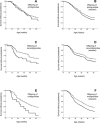Maternal malaria and gravidity interact to modify infant susceptibility to malaria
- PMID: 16259531
- PMCID: PMC1277932
- DOI: 10.1371/journal.pmed.0020407
Maternal malaria and gravidity interact to modify infant susceptibility to malaria
Abstract
Background: In endemic areas, placental malaria due to Plasmodium falciparum is most frequent and severe in first-time mothers, and increases the risk of infant mortality in their offspring. Placental malaria may increase the susceptibility of infants to malaria parasitemia, but evidence for this effect is inconclusive.
Methods and findings: During 2002-2004, we monitored parasitemia in 453 infants, including 69 who were born to mothers with placental malaria, in a region of northeastern Tanzania where malaria transmission is intense. We used a Cox proportional hazards model to evaluate the time from birth to first parasitemia, and a generalized estimating equations logistic regression model to evaluate risk of any parasitemia throughout the first year of life. Compared with infants whose mothers did not have placental malaria at delivery ("PM-negative"), offspring of mothers with placental malaria at delivery ("PM-positive") were 41% more likely to experience their first parasitemia at a younger age (adjusted hazard ratio [AHR] = 1.41, 95% confidence interval [CI] 1.01-1.99). The odds of parasitemia throughout infancy were strongly modified by the interaction between placental malaria and gravidity (p for interaction = 0.008, Type 3 likelihood ratio test). Offspring of PM-negative primigravidae had lower odds of parasitemia during infancy (adjusted odds ratio [AOR] = 0.67, 95% CI 0.50-0.91) than offspring of PM-negative multigravidae, and offspring of PM-positive primigravidae had the lowest odds (AOR = 0.21, 95% CI 0.09-0.47). In contrast, offspring of PM-positive multigravidae had significantly higher odds of parasitemia (AOR = 1.59, 95% CI 1.16-2.17).
Conclusion: Although parasitemia is more frequent in primigravid than multigravid women, the converse is true in their offspring, especially in offspring of PM-positive women. While placental malaria is known to increase mortality risk for first-born infants, it surprisingly reduced their risk of parasitemia in this study. Placental malaria of multigravidae, on the other hand, is a strong risk factor for parasitemia during infancy, and therefore preventive antimalarial chemotherapy administered to multigravid women close to term may reduce the frequency of parasitemia in their offspring.
Conflict of interest statement
Figures



References
-
- Garnham PCC. The placenta in malaria with special reference to reticulo-endothelial immunity. Trans R Soc Trop Med Hyg. 1938;32:13–48.
-
- Fried M, Duffy PE. Adherence of Plasmodium falciparum to chondroitin sulfate A in the human placenta. Science. 1996;272:1502–1504. - PubMed
-
- Fried M, Nosten F, Brockman A, Brabin BJ, Duffy PE. Maternal antibodies block malaria. Nature. 1998;395:851–852. - PubMed
-
- Ricke CH, Staalsoe T, Koram K, Akanmori BD, Riley EM, et al. Plasma antibodies from malaria-exposed pregnant women recognize variant surface antigens on Plasmodium falciparum-infected erythrocytes in a parity-dependent manner and block parasite adhesion to chondroitin sulfate A. J Immunol. 2000;165:3309–3316. - PubMed
Publication types
MeSH terms
Grants and funding
LinkOut - more resources
Full Text Sources
Other Literature Sources

